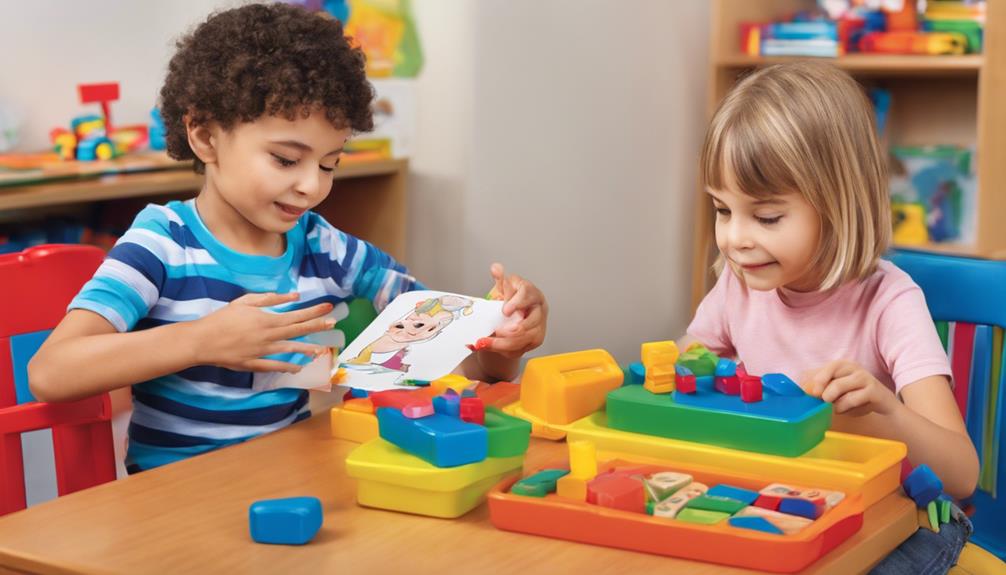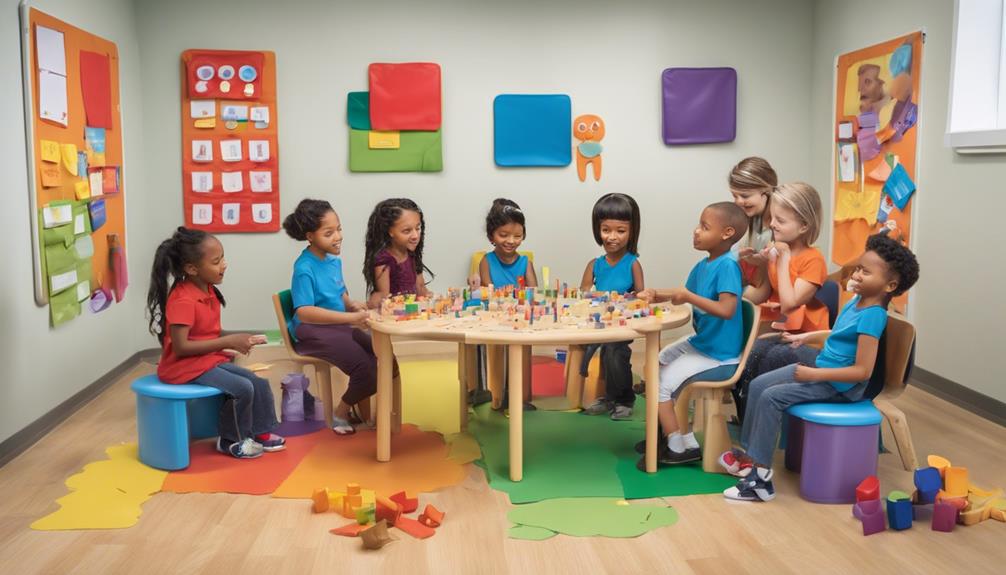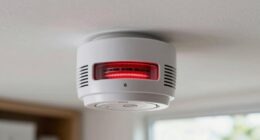In the field of pediatric speech therapy, we dedicate ourselves to nurturing the growth and progress of our young patients, much like caring for a delicate sapling.
But what exactly does this specialized field entail? Well, imagine the intricate dance between a child's thoughts and their ability to express them. We guide this intricate process, sculpting clear articulation and fostering robust comprehension.
However, the true magic lies in the transformative impact it has on children's lives.
Curious to learn more about the secrets hidden within each therapy session?
Key Takeaways
- Enhancing language and communication skills in children of all ages.
- Customizing therapy sessions to address specific speech disorders effectively.
- Using a variety of techniques like articulation exercises and games for learning.
- Playing a pivotal role in improving communication skills and quality of life.
Speech Therapy for Children
When providing speech therapy for children, speech-language pathologists focus on enhancing language and communication skills through interactive and tailored activities. Pediatric SLPs work with children of all ages, from newborns to teenagers, to address various speech disorders such as articulation issues, fluency challenges, and voice disorders. These therapy sessions are customized to meet each child's specific needs, aiming to improve their articulation, comprehension, and expression abilities.
In pediatric speech therapy, the primary goal is to help children develop effective communication skills that will positively impact their social interactions and overall quality of life. Through engaging activities and targeted interventions, pediatric SLPs create a supportive environment for children to enhance their language abilities and overcome communication barriers. Early intervention is key in addressing speech disorders, as it can lead to significant improvements in a child's communication proficiency and social engagement. By focusing on the individual needs of each child, pediatric speech therapy plays a vital role in promoting successful communication development.
Identifying Speech Disorders

As speech therapists, we recognize the importance of identifying speech disorders promptly. Understanding the various types of speech disorders, the benefits of early intervention, and the diagnostic assessment process are key components in effectively addressing these challenges.
Speech Disorder Types
In pediatric speech therapy, identifying speech disorders involves recognizing differences in sound production, speech flow, and voice quality. When addressing speech disorder types, it's crucial to understand the specific characteristics of each condition.
Here are key points to consider:
- Articulation Disorders: These impact the correct production of sounds, affecting speech clarity.
- Fluency Disorders: Such as stuttering, these disrupt the flow of speech, leading to hesitations or repetitions.
- Voice Disorders: Abnormalities in pitch, volume, or quality can hinder effective communication.
- Tailored Therapy Approaches: Each child may require personalized interventions to target their unique speech challenges effectively.
Early Intervention Benefits
Early intervention plays a crucial role in maximizing the effectiveness of pediatric speech therapy by addressing speech disorders proactively. Identifying speech disorders early on through interventions can greatly impact a child's communication skills, leading to improved quality of life and more favorable outcomes. By seeking speech therapy at an early stage, children with speech disorders can develop better self-assurance and overcome academic and social challenges. This proactive approach supports children in realizing their full potential and enhances their overall well-being. Embracing early intervention not only improves communication abilities but also sets the foundation for a brighter future for children struggling with speech disorders.
| Early Intervention Benefits |
|---|
| – Proactive approach to address speech disorders |
| – Improved communication skills |
| – Enhanced quality of life |
Diagnostic Assessment Process
Through a comprehensive diagnostic assessment process, pediatric speech therapists evaluate speech, language, and communication skills to pinpoint specific disorders and create tailored treatment plans.
- Speech-language pathologists conduct detailed assessments to identify areas of difficulty accurately.
- Observation of speech patterns, interactions, and responses assists in diagnosing speech disorders effectively.
- Assessment tools such as standardized tests, informal observations, and parent interviews provide comprehensive information.
- The diagnostic process is crucial for tailoring interventions to address individual needs and promote effective communication skills development.
Techniques in Therapy Sessions

How do therapists incorporate engaging activities in pediatric speech therapy sessions to enhance language skills and communication development?
In these sessions, therapists may utilize articulation exercises to target specific speech sounds such as /s/ or /r/, aiding in speech clarity. Engaging activities like games and puzzles are integrated to make learning enjoyable, fostering language skills and stimulating communication development.
Furthermore, practice sessions may focus on fluency, voice modulation, and receptive language skills to address various speech disorders effectively. During these sessions, therapists offer feedback and positive reinforcement, essential for monitoring progress and keeping children motivated throughout their speech therapy journey.
Customized treatment plans may also include nonverbal communication exercises to enhance overall communication abilities, providing a holistic approach to speech therapy. By incorporating these techniques into therapy sessions, therapists can create a supportive and effective environment for children to improve their language skills and communication abilities.
Role of Speech-Language Pathologists
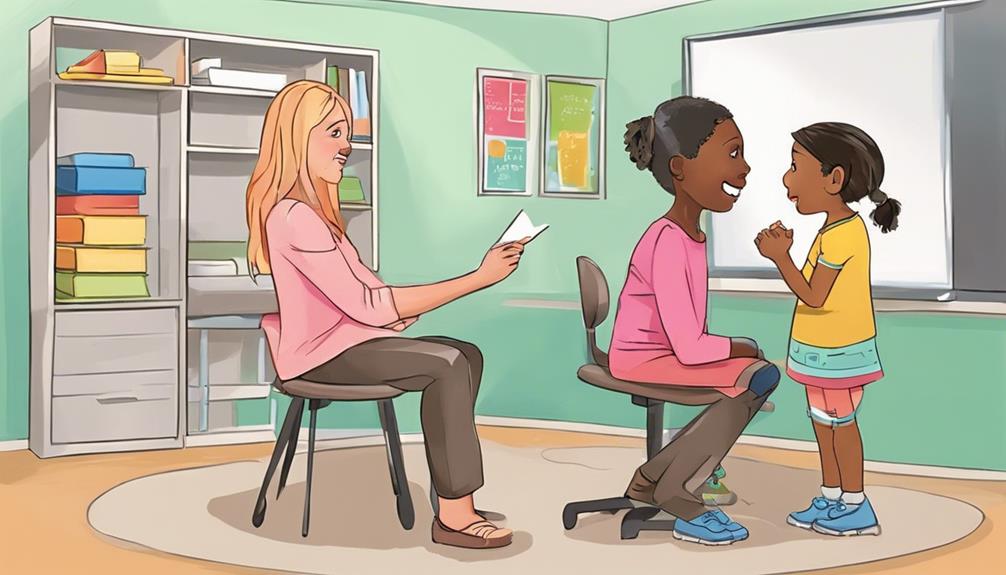
Speech-Language Pathologists play a pivotal role in enhancing communication skills and addressing various disorders in pediatric patients through specialized therapy sessions. Here are four key aspects of their role:
- Diagnosing and Treating Communication Disorders:
SLPs specialize in diagnosing and treating a wide range of communication disorders such as speech, language, voice, and swallowing difficulties in pediatric patients.
- Creating Individualized Treatment Plans:
Collaborating closely with pediatricians, Speech-Language Pathologists develop personalized treatment plans based on thorough evaluations to address the specific needs of each child.
- Addressing Social Communication Challenges:
SLPs play a crucial role in helping children overcome social communication challenges, literacy impairments, and cognitive issues, improving their overall quality of life and social interactions.
- Identifying and Treating Autism Spectrum Disorders:
Speech-Language Pathologists are instrumental in identifying and providing therapy for conditions like autism spectrum disorders that can significantly impact a child's communication abilities and development.
Communication Milestones

Monitoring communication milestones is crucial for identifying potential delays in children's development.
By tracking developmental speech stages, language skills, and the progression of articulation abilities, we can detect concerns early on.
Recognizing the benefits of early intervention can lead to tailored support and improved outcomes for children's communication abilities.
Developmental Speech Stages
Tracking communication milestones from infancy to early childhood is essential for assessing a child's developmental speech stages.
- 0-3 Months: During this period, babies typically start cooing and making sounds in response to stimuli.
- 6-9 Months: Babies start babbling and imitating sounds they hear around them, laying the foundation for language development.
- 12-18 Months: Toddlers begin to say their first words and start combining words to form simple phrases.
- 2-3 Years: Children's vocabulary expands rapidly, and they can engage in more complex conversations, demonstrating significant progress in their language skills.
Monitoring these stages helps identify delays in communication milestones and allows for timely intervention through pediatric speech therapy, leading to improved outcomes for children.
Language Skills Progression
As we observe the progression of language skills in children, we witness the gradual evolution of their communication abilities from infancy through early childhood. Tracking communication milestones from 0-3 months to 2-3 years is crucial in monitoring language development. By monitoring feeding, articulation, and language skills, any delays in communication milestones can be identified early on.
Recognizing and seeking professional help for unmet communication milestones is essential for timely intervention. Speech therapy plays a vital role in addressing delays in communication milestones and supporting children in reaching their full potential. Early identification of communication delays through milestone monitoring leads to more favorable outcomes in speech therapy, especially for children with developmental delays.
Early Intervention Benefits
Early intervention in pediatric speech therapy significantly enhances communication skills and fosters positive outcomes for children. Monitoring communication milestones from 0-3 months to 2-3 years is crucial for identifying delays and providing timely intervention.
Seeking professional help for unmet communication milestones can effectively address speech and language challenges. Early identification of speech issues through milestone monitoring enables children to realize their full potential.
Professional assessment and intervention for unmet communication milestones play a vital role in children's overall development. It's essential to recognize the significance of early intervention in addressing speech difficulties and supporting children in achieving their communication milestones for optimal growth and success.
Addressing Communication Challenges

Addressing communication challenges in pediatric speech therapy involves tailoring individualized treatment plans to help children improve communication skills and overcome articulation delays, language disorders, and cognitive-communication issues.
Speech-language pathologists focus on addressing various conditions like stuttering, voice disorders, and apraxia of speech to enhance speech clarity and overall communication abilities.
Additionally, they work with children to navigate social communication difficulties, enabling them to engage more effectively with others.
Becoming a Pediatric Speech Pathologist

When embarking on the journey to become a pediatric speech pathologist, individuals typically start by obtaining a Bachelor's Degree in SLP or a related field. This foundational education provides a solid understanding of speech and language development, communication disorders, and therapeutic techniques.
Here are four key steps in the educational path to becoming a pediatric speech pathologist:
- Education: After earning a Bachelor's Degree, aspiring pediatric speech pathologists pursue a Master's Degree in Speech Pathology or Communication Sciences, focusing on pediatric speech therapy.
- Certification: Completing clinical hours and passing certification exams, such as the CCC (Certificate of Clinical Competence), are crucial for becoming a certified pediatric speech pathologist.
- Skills: Developing strong communication, critical thinking, and problem-solving abilities are essential skills for effectively working with children in speech therapy.
- Training: The educational journey to become a pediatric speech pathologist typically involves about 7 years of education and training, including internships and practical experiences.
Skills Needed for Pediatric SLP

Upon embarking on the journey to become a pediatric speech pathologist, one must possess essential skills to effectively interact with children and their families. Communication skills stand as a cornerstone for pediatric SLPs, enabling them to connect with young patients and their caregivers in a meaningful way.
Moreover, critical thinking skills play a vital role in analyzing and addressing communication disorders in children, guiding the development of tailored treatment plans. Problem-solving abilities are equally crucial, empowering pediatric SLPs to devise innovative solutions to overcome speech challenges on an individual basis.
Understanding child development and communication milestones is paramount for assessing and treating speech disorders accurately. Additionally, empathy and patience are indispensable traits for pediatric SLPs to establish trust with children and provide the necessary support for their communication journey.
Efficacy and Benefits of Speech Therapy
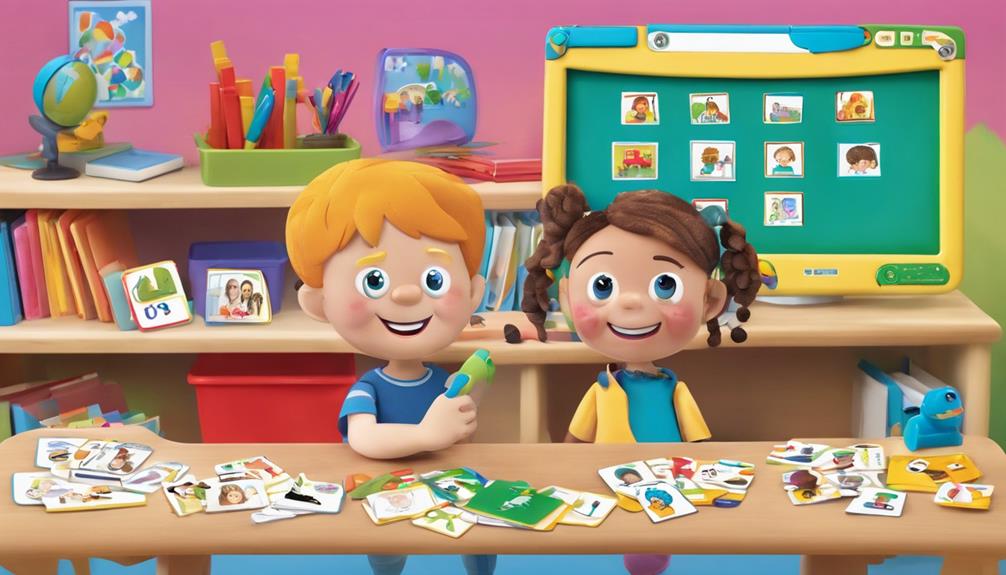
Speech therapy effectively enhances various aspects of communication skills and cognitive abilities, providing invaluable benefits to individuals of all ages.
Here are four key benefits of speech therapy:
- Improved Self-Esteem:
Speech therapy has been proven effective in boosting self-esteem by helping individuals communicate more confidently and effectively.
- Enhanced Cognitive Skills:
It offers benefits such as improved comprehension, memory, and problem-solving abilities, contributing to overall cognitive development.
- Independence in Communication:
With speech therapy, individuals can gain independence in expressing their thoughts and needs, leading to better social interactions and relationships.
- Better Vocal Quality:
Speech therapy can help individuals develop clearer articulation, voice modulation, and fluency, enhancing their vocal quality and making communication more effective and engaging.
Frequently Asked Questions
What to Expect at Childs Speech Therapy?
At our child's speech therapy sessions, you can expect:
- Engaging activities to enhance communication skills
- Targeted exercises to improve nonverbal abilities
- Regular feedback for tracking progress
- Customized treatment plans tailored to individual needs
Through these sessions, we aim to boost communication proficiency and self-assurance. Positive reinforcement is provided to encourage growth and development in a supportive environment.
Your child will receive comprehensive care to help them thrive in their communication journey.
What Is the Role of Pediatric Speech Therapist?
As pediatric speech therapists, we play a vital role in helping children improve their communication skills. We evaluate, diagnose, and treat various speech, language, and swallowing disorders. Our training equips us to address conditions like autism spectrum disorders that affect communication abilities.
Through structured yet playful therapy approaches, we celebrate milestones and progress towards each child's unique communication goals. Our goal is to empower children to express themselves effectively and confidently.
What Does Speech Therapy Consist Of?
In speech therapy, we engage in activities to enhance communication skills by focusing on sounds, words, and understanding instructions.
These practice sessions aim to improve nonverbal communication abilities and provide regular feedback for effective progress tracking.
Our goal is to boost children's communication proficiency and self-assurance through engaging therapy sessions with positive reinforcement.
At What Age Should a Child See a Speech Therapist?
If a child shows signs of speech or language delays, it's crucial to seek help early. Seeing a speech therapist as soon as possible can make a big difference in their development.
The American Speech-Language-Hearing Association recommends considering therapy for children as young as 12-15 months to address any concerns. Early intervention is key, and parents shouldn't hesitate to consult a speech therapist if they notice any difficulties in their child's communication skills.
Conclusion
In conclusion, pediatric speech therapy transforms tiny tongues into talking treasures, unlocking language barriers and building bright futures.
From playful practices to precise pronunciation, speech-language pathologists pave the path to proficient communication. With tailored techniques and targeted treatment plans, children conquer challenges and achieve communication milestones.
Embracing effective therapy ensures enhanced efficacy and everlasting benefits for budding communicators. So, let's celebrate the power of pediatric speech therapy as a vital tool for speech success!

